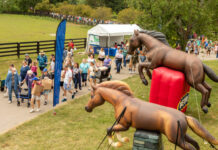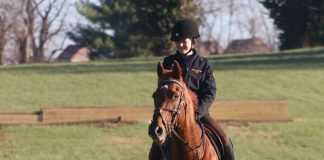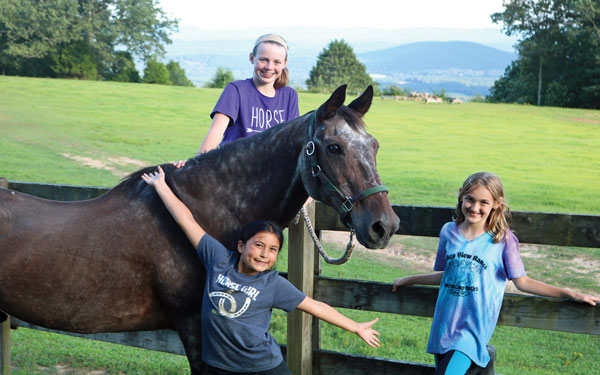
 You’ve waited months for this—it’s finally time to reserve your spot at horse camp! You need to do this in January or February to avoid camps running out of space or so you can get an early-bird discount. Here are some questions to think about to make sure you’re making the best decision.
You’ve waited months for this—it’s finally time to reserve your spot at horse camp! You need to do this in January or February to avoid camps running out of space or so you can get an early-bird discount. Here are some questions to think about to make sure you’re making the best decision.
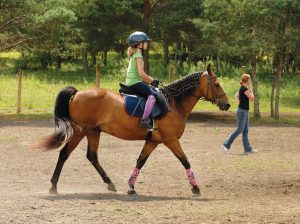
Do you want to attend a day or overnight camp?
How far do you want to go from home?
When it comes to overnight camp, distance from your home is important to consider. If a camp is 10 hours away and you decide you don’t like it and want to come home, it may not be possible for your parents to come get you immediately. Think about finding a camp that is close enough to be con-venient while still having all of the activities you want.
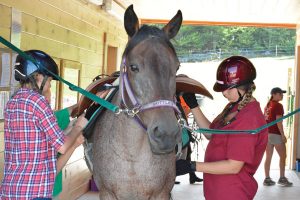
What is your parents’ budget for camp?
Your parents will want to come up with a budget for your camp experience. Camps can vary widely in price, so this is super important. You don’t want to get your heart set on one that your par-ents can’t afford to send you to.
Usually this information is avail-able on the camp website. You may end up having to go for fewer weeks if your camp of choice turns out to be a more expensive option, but together with your parents, you can decide what type of trade-off makes sense.
Do you want an all-horse camp?
There are two types of camps with horses: those where horses are one of many available activities (where you may only spend an hour or two each day at the barn), and those camps where horses are the focus almost all day long.
“All horse, all the time” camps are usually easy to pinpoint by their ads and websites, but make sure to have a parent call up to find out exactly what the daily schedule looks like. You don’t want to get there and find out “horse camp” is actually swimming, archery, sports, crafts and a million other things when all you wanted was a horse-crazy experience!
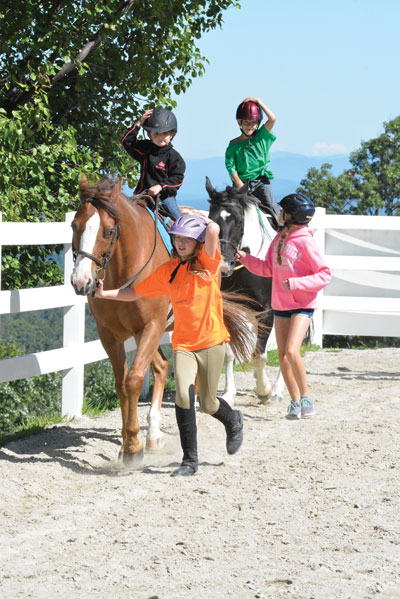
How much time will you spend in the saddle?
As part of the investigation into your camp options, find out how much time you’ll get in the saddle. Will there be multiple rides per day, like a jumping lesson plus a trail ride? Will you get to work in the barn, if that’s important to you? Some camps may saddle the horses for you so you just have to hop on for your lesson.
Will you ride one camp horse or several?
Some horse camps may allow you to bring your own horse from home, but we recommend trying a new horse so you can experience something different. If you aren’t going to be riding your horse, find out if you’ll get to ride the same camp horse all week so that you get to bond and learn his quirks. Maybe you can switch from western to English (or vice versa) so that your camp experience is really fresh and new.
Many camps end in a horse show for campers, which is great fun as your parents get to watch and take pictures of all the new skills you’ve picked up.
Can you visit first?
If at all possible, it’s always best to visit a camp before deciding. Many have open houses in early spring so you can meet the owners and managers. This will give you a good feeling about whether or not it matches up with what you’re looking for. It may even give you a head start on meeting your new camp friends, one of the best parts of all! These kids can become your pen pals or BFFs as you continue on your horse-crazy journey through life.
Interested in becoming a counselor?Maybe you’ve already been to camp several times and want to move up in the ranks to counselor, where you can guide others who are new to the experience. Smaller camps may only have full-fledged counselors who must be over 18. But often the larger programs will have younger teens as “counselors in training” (or CITs) for an in-between step. This might be a perfect role for you! First, think about the added responsibility. Are you interested in interacting with and helping new campers? There are often lonely or homesick kids at camp, and they will need a sympathetic person to help them get through being away from home. You can be that listening ear or shoulder to lean on. Are you comfortable giving directions? You may have to herd groups to different activities, which is great leadership practice. Even if this sounds intimidating, you can get the hang of it with a bit of practice. You may also have a chance to teach horsemanship skills to beginner riders that don’t know how to catch, lead, groom or saddle a horse. This is great fun as you get to share your passion for your favorite hobby, but you have to go slow and make sure the kids understand why things are done a certain way so that they stay as safe as possible at all times. If all of this sounds appealing, contact your camp today to ask about becoming a counselor or counselor in training. |
This article on choosing a horse camp appeared in the January/February 2020 issue of Young Rider magazine. Click here to subscribe!



